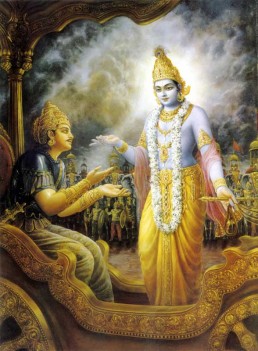Those who live in complete disregard of the Self, necessarily “RETURN WITHOUT ATTAINING ME.” Men of extroversion, meditating upon the sense objects and bartering away their intellectual capacities, emotional powers, and physical strength for seeking, acquiring and possessing the implements to work out their sensual satisfaction, must necessarily return to “THE PATH OF REBIRTH, FRAUGHT WITH DEATH.”The more an individual meditates upon the finite, strives to gain the changeable, and gets choked by the sorrows of the perishable, the more he comes to worship and court the lower nature of the Self, the Prakriti. However big the ocean may be, a drop of it, taken from anywhere in its infinite expanse, should taste saline. In the same way, whatever be the motive behind the courting, once we allow ourselves to be courtiers of the world-of-objects, we are doomed to taste the saline tears of sorrow, because of the very ephemeral nature of the “objects of our love.”
The world of names and forms is finite and ever-changing. At every moment, every object is living through a process of change, and each change is death to the previous state of existence of the object. Thus, the term “death” used here by Krishna in his phrase “FRAUGHT WITH DEATH” is to be understood in this liberal meaning of the term. In short, courtiers of the finite reach the tragic realms of constant death.
In the perfect Science of Vedanta, though Shraddha also implies “faith” in the Tagorean sense of the term, it is not built upon the misty vapours of emotionalism, but upon the solid beams of intellectual understanding and perfect awareness of the logic of thought behind the theory. Shankara defines Shraddha as the “moulding of the life and living, on the basis of right intellectual comprehension of what the scripture indicates and the teachers explain.” It is the enduring faith that lifts us to realms beyond the reach of the mind and intellect, and helps to carve out of the mortal and the finite, the Immortal and the Infinite.
Something without which a substance cannot be that very substance is called its Dharma or essence; e. g., heat in fire, cold in ice. Those who have no faith in the Divine Essence, which is the Self in them, get easily abducted by the cooings of their emotions, or the barkings of their intellect, or the whisperings of their flesh. They slip into devolution and come to live as biped animals, when they lose their faith in the Divine core which is the Essential Being. A mad king, who has forgotten his own kingship, throws his kingly dignity to the winds and runs about naked on the streets, behaving as though he were a homeless vagabond. Similarly, an individual, in his forgetfulness of the dignity of his essential Self-hood, comes to live in the open streets of sense pleasures, hunting for his satisfactions, as though he were nothing better than a crawling worm in some wayside ditch.
Simple-looking though it be, this stanza is pregnant with untold suggestiveness. By contrasting thus the “Path-of-Knowledge” with the “Path-of-Ignorance” in the most vivid terms, Krishna brings to the comprehension of Arjuna the advisability of the blessed path of Higher seeking, the realisation of the Imperishable.
IN THE FOLLOWING, KNOWLEDGE IS THEREFORE GLORIFIED, WHEN KRISHNA EXPLAINS THAT DHARMA, WHICH IS TO BE FOLLOWED IS:

